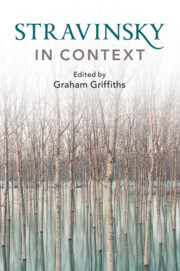Book contents
- Stravinsky in Context
- Composers in Context
- Stravinsky in Context
- Copyright page
- Contents
- Illustrations
- Contributors
- Preface
- Abbreviations
- Frontispiece
- Epigraph
- Part I Russia and Identity
- Part II Stravinsky and Europe
- Part III Partnerships and Authorship
- Part IV Performance and Performers
- Part V Aesthetics and Politics
- Part VI Reception and Legacy
- Chapter 29 The Apollonian Clockwork Rewound
- Chapter 30 Stravinsky Reception in the USSR
- Chapter 31 The Stravinsky/Craft Conversations in Russian and Their Reception
- Chapter 32 Publishing Stravinsky
- Chapter 33 Copyright, the Stravinsky Estate and the Paul Sacher Foundation
- Chapter 34 Evoking the Past, Inspiring the Future
- Chapter 35 ‘Music is, by its very nature, essentially powerless to express anything at all’
- Recommendations for Further Reading and Research
- Index
- Endmatter
Chapter 31 - The Stravinsky/Craft Conversations in Russian and Their Reception
from Part VI - Reception and Legacy
Published online by Cambridge University Press: 03 December 2020
- Stravinsky in Context
- Composers in Context
- Stravinsky in Context
- Copyright page
- Contents
- Illustrations
- Contributors
- Preface
- Abbreviations
- Frontispiece
- Epigraph
- Part I Russia and Identity
- Part II Stravinsky and Europe
- Part III Partnerships and Authorship
- Part IV Performance and Performers
- Part V Aesthetics and Politics
- Part VI Reception and Legacy
- Chapter 29 The Apollonian Clockwork Rewound
- Chapter 30 Stravinsky Reception in the USSR
- Chapter 31 The Stravinsky/Craft Conversations in Russian and Their Reception
- Chapter 32 Publishing Stravinsky
- Chapter 33 Copyright, the Stravinsky Estate and the Paul Sacher Foundation
- Chapter 34 Evoking the Past, Inspiring the Future
- Chapter 35 ‘Music is, by its very nature, essentially powerless to express anything at all’
- Recommendations for Further Reading and Research
- Index
- Endmatter
Summary
Two months after Stravinsky’s death a remarkable publication appeared in the Soviet Union: the first ever translation into Russian of the four Stravinsky/Craft Conversation books.1 Entitled Dialogy (‘Dialogues’) it was a single-volume composite edition and, subject to pressure from the censors, the name of Robert Craft was removed from the title page. As the editorial preface explained: ‘These are Stravinsky’s conversations with his secretary – a conductor, Robert Craft – but essentially it is a monologue: Craft just asks short questions. It is only Stravinsky who expresses an opinion.’ The volume’s editor, Leningrad Conservatoire professor Mikhail Druskin (1905–91), was obliged to make endless changes and omissions reflecting the sensitivities of the Soviet authorities. Druskin’s planned second edition (which remained unpublished) attempted an explanation about the several postponements to the publication of Dialogy: ‘This was not a coincidence but something characteristic of those times. (The dead, as we know, are not able to commit seditious acts!)’2 The delays reflected the very real fears of the publishers and censors that Stravinsky might reiterate his critical views of the Soviet state and, as a result, the book’s distribution might be withheld and those involved with its publication might be punished. The best policy, therefore, was to wait until the composer had died; the authorisation to print Dialogy was issued on 4 June 1971.
- Type
- Chapter
- Information
- Stravinsky in Context , pp. 279 - 287Publisher: Cambridge University PressPrint publication year: 2020



